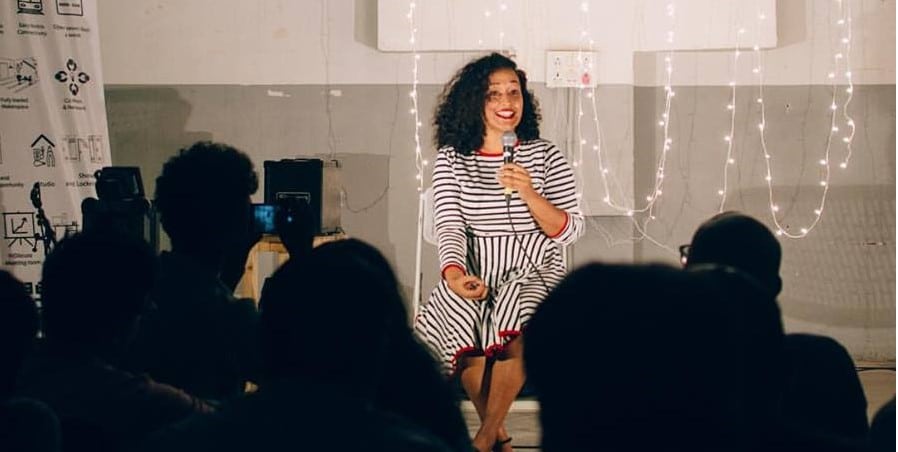Arts
Spoken Word Artiste Nupur Saraswat Is Here to Make a Scene

Singapore-based spoken word artiste Nupur Saraswat talks about feminism, her art and Two Sanskari Girls.
Writing about Nupur Saraswat, a spoken word artiste from Singapore, is a struggle. She refuses to get pigeonholed in any narrative, and makes her own.
Saraswat, 22, first came into media spotlight in India in June, after being denied a hotel room in Hyderabad for being a “single woman traveler”. Her furious online post that questioned the hotel, which had told her that the “area is not in the right place for women”, for refusing her a room that she had already paid for while having no qualms about putting her out in the very same streets they deemed not safe, went viral. The single woman traveler reclaiming public spaces then became a part of social media conversation.
She went on to start a petition to the Hotels Association of India to end the discriminatory practice. Her petition says: “Today it is me, tomorrow it could be any one of us. These regressive policies affect all of us and have large scale implications. It could mean a domestic violence survivor running away from an abusive home will not be given shelter in a cheap hotel just because she is alone or maybe because she is a local resident. Women’s safety cannot be only about eve teasing, molestation or rape. It is also about making spaces safe and available.”
A month later, Saraswat, along with her friend and collaborator Kate Black Regan, showcased their hour-long show called Two Sanskari Girls that addressed the everyday, often invisible microaggressions women face in their lives: domestic violence, toxic relationships, body autonomy, body image, sexism.
The Two ‘Sanskari’ Girls
“At the time of its conception, I had been in India for about 5 months and there was an accumulation of emotions that had to be channeled about my everyday encounters with Sanskars,” Saraswat told Little India. “So I sat down with three of the most brilliant women I knew on the scene at the time — Kate, Karunya, and Shilok — and wrote, directed, and choreographed an hour long non-linear show that didn’t mince any words. What came out of it was pure magic.”
Regan is a theatre artiste, while Bharatanatyam dancer Karunya, and poet and trans rights activist Shilok were featured as cameos. The debut performance of Two Sanskari Girls in Bengaluru was attended by 400 people in the age group of 5 to 85 years.
“Personally I think that day spoken word transcended beyond it ever had in the city,” Saraswat said. Then she and Regan — the titular Sanskari girls — took the show to Mumbai, Berlin, Paris and Amsterdam. And realized that the conversation surrounding feminism is universal.
Wordly Wise
Since she was born on 15th August in a government hospital in Jaipur, her grandmother wanted to name her Azaadi. “I wonder what that would have been like,” Saraswat quips. She moved to Singapore at the age of 15 for education and currently works as a spoken word artiste, a writer, an environmental engineer and a recruitment consultant.
As a spoken word artiste with an electric stage presence, Saraswat keeps you glued to her words by emphasizing them with her gestures and movement. Insightful, cutting and often funny, she came on the spoken word scene two years ago.
“I have been writing my whole life and I cannot find another way to express myself the way writing does,” she says. “As a debater growing up, spoken word came very naturally to me. I usually talk about how I saw one video on button poetry, quite like most Indian spoken word artistes, and just knew that I was meant to do that. So my introduction to spoken word was pretty traditional and now I can’t imagine what my life would be like without it.”
Saraswat recently did a video where she performed her piece To The Girls Who Go Out at Night to shine light on the petition she had started for Hotels Association of India. However, for a poet whose work draws from her personal experience, a schedule as packed as this one is a challenge.
She says: “I don’t get much of free time, I make space to be consciously idle. The importance of it is magnanimous in my head.” So she prefers to travel to new cities as part of her work, and takes the time to roam the streets, visit bars, and take time to do nothing at all. “And accept the things that hurt me,” she adds. “Also, recognize the things that empower me, be grateful for things that support me — not write about it, just think about it. I find that I have been able to find myself in most cities I have got lost in.”
The Spoken Word Scene
Her poetry talks of gender roles, body image, and privilege and identity as a brown woman. As a member of a minority community in Singapore, her experience is often dismissed in India because she has lived abroad. “The color of my skin has pushed me back and forth,” Saraswat observes.
The spoken word artistes she admires are Deborah Emmanuel from Singapore, and Rochelle D’Silva from Mumbai. “Amazing, strong, biting women and even better artistes,” she says about them. “I am a sucker for poets who are versatile enough to make you feel like a lover one minute and a fighter the next, all in a 30-minute set.”



